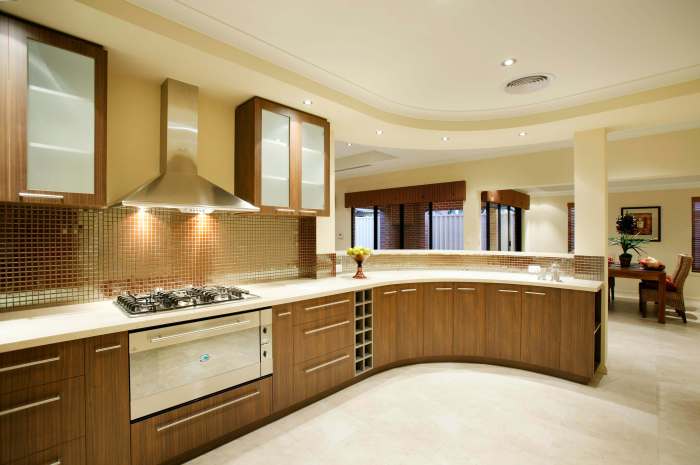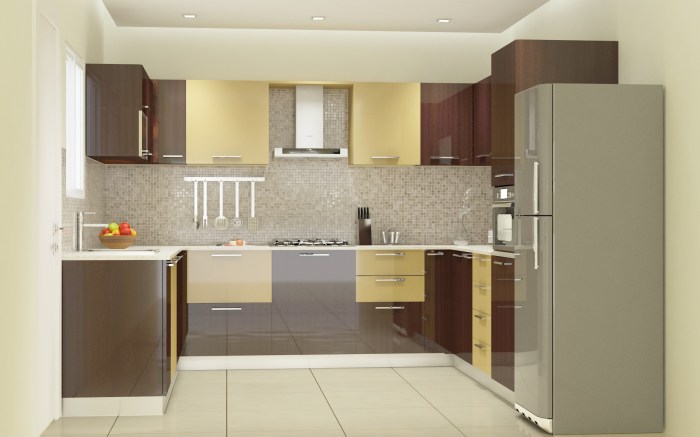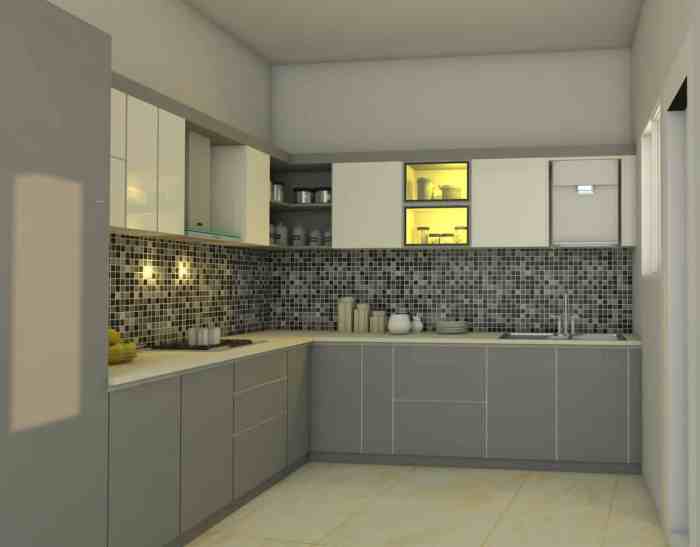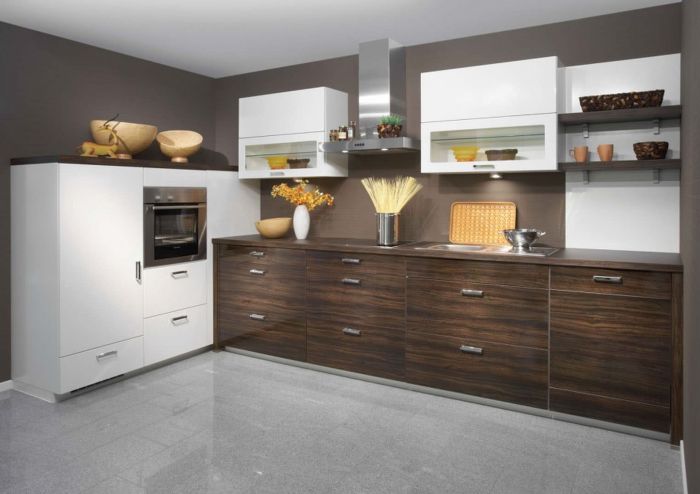Essential Elements of a Well-Designed Modular Kitchen: Dive into the world of modular kitchens and discover the key components, design considerations, materials, customization options, and installation and maintenance tips to create your dream kitchen.
From planning the layout to selecting the perfect materials and finishes, this comprehensive guide will empower you to design a modular kitchen that meets your unique needs and preferences.
Essential Elements of a Modular Kitchen
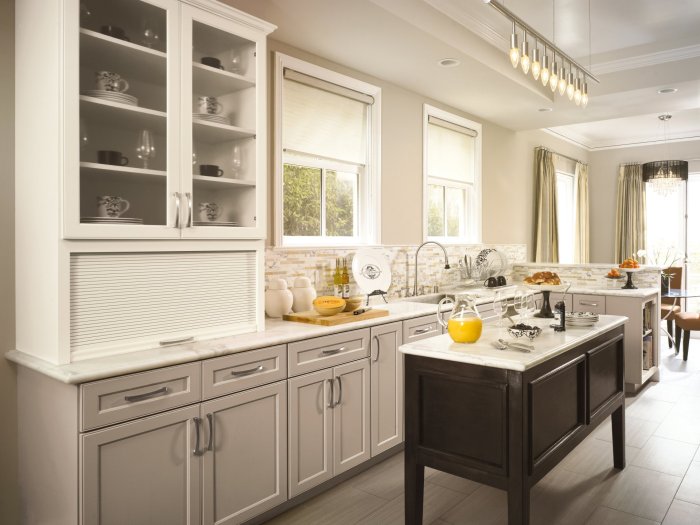
A modular kitchen is a type of kitchen that is made up of pre-fabricated units that can be assembled in a variety of ways to create a customized kitchen that meets the specific needs of the homeowner. Modular kitchens offer a number of advantages over traditional kitchens, including:
- Flexibility: Modular kitchens can be easily reconfigured to accommodate changes in the homeowner’s needs or lifestyle.
- Efficiency: Modular kitchens are designed to maximize space and efficiency, making them ideal for small kitchens or kitchens with awkward layouts.
- Durability: Modular kitchens are made from high-quality materials that are designed to withstand the rigors of everyday use.
- Affordability: Modular kitchens are typically more affordable than traditional kitchens, making them a great option for homeowners on a budget.
The key components of a modular kitchen include:
- Cabinets: Cabinets are the most important component of a modular kitchen. They provide storage for food, cookware, and other kitchen essentials. Cabinets come in a variety of styles and finishes, so homeowners can choose the ones that best match their taste and décor.
- Drawers: Drawers are another important component of a modular kitchen. They provide easy access to frequently used items, such as utensils, spices, and pots and pans. Drawers come in a variety of sizes and configurations, so homeowners can choose the ones that best meet their needs.
- Countertops: Countertops are the work surface of a kitchen. They are used for preparing food, eating, and entertaining. Countertops come in a variety of materials, including laminate, granite, and quartz. Homeowners should choose a countertop that is durable, easy to clean, and resistant to heat and stains.
- Appliances: Appliances are the final component of a modular kitchen. They provide the functionality that homeowners need to cook, bake, and clean. Appliances come in a variety of sizes and styles, so homeowners can choose the ones that best meet their needs and budget.
Design Considerations for a Well-Designed Modular Kitchen
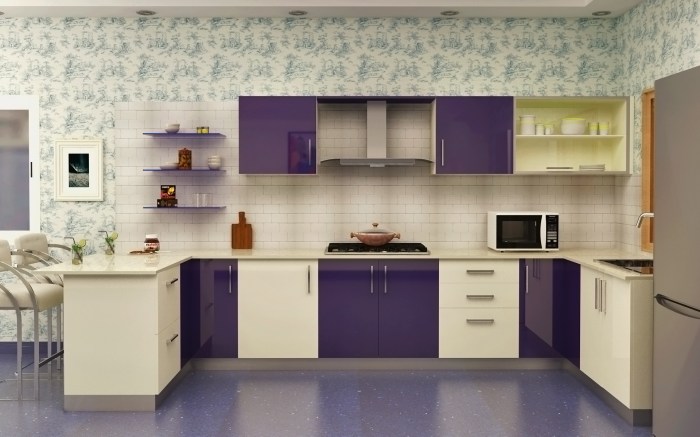
Designing a well-designed modular kitchen involves careful planning and consideration of various factors. By adhering to specific guidelines, you can create a functional and efficient kitchen that meets your needs and enhances your cooking experience.
Layout Planning
The layout of your modular kitchen should be planned around the kitchen triangle, which refers to the three main work areas: the sink, stove, and refrigerator. The optimal arrangement of these elements ensures efficient workflow and minimizes unnecessary movement.
Additionally, consider your storage needs and allocate ample space for cabinets, drawers, and shelves. Vertical storage solutions, such as pull-out drawers and wall-mounted shelves, can maximize space utilization and keep your kitchen organized.
Ergonomics and Accessibility
Ergonomics plays a crucial role in kitchen design, as it focuses on creating a comfortable and accessible workspace. The height of countertops, placement of appliances, and overall kitchen layout should be designed to minimize strain and fatigue.
Accessibility is also essential, especially for individuals with mobility limitations. Consider the width of aisles, the reach of cabinets, and the ease of access to appliances to ensure a safe and convenient cooking environment for all.
Materials and Finishes for Modular Kitchens
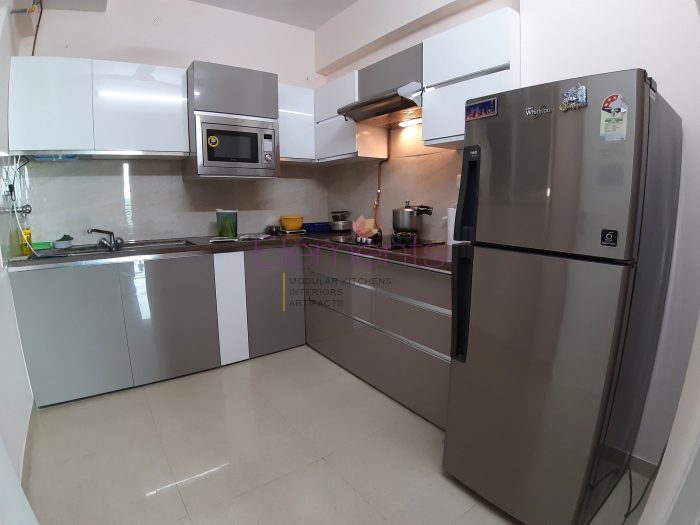
Selecting the right materials and finishes for your modular kitchen is crucial for both aesthetics and functionality. From cabinets to countertops and backsplashes, each element plays a significant role in creating a cohesive and well-designed space.
Cabinets
Kitchen cabinets form the foundation of your kitchen design, and the material you choose will impact its durability, appearance, and overall cost. Here are some popular options:
- Wood:Classic and timeless, wood cabinets offer warmth and character. They come in various species, such as oak, maple, and cherry, and can be stained or painted to match your style.
- Laminate:A budget-friendly option, laminate cabinets are durable, easy to clean, and available in a wide range of colors and patterns.
- Thermofoil:Similar to laminate, thermofoil cabinets have a durable plastic exterior that resists scratches and stains.
- Acrylic:Acrylic cabinets feature a glossy, high-shine finish that creates a modern and sleek look.
Countertops
The countertop is a workhorse in your kitchen, so it’s important to choose a material that is both durable and aesthetically pleasing. Consider these options:
- Granite:A natural stone, granite is heat-resistant, scratch-resistant, and available in a variety of colors and patterns.
- Quartz:Engineered from natural quartz, quartz countertops are non-porous, scratch-resistant, and stain-resistant.
- Laminate:A budget-friendly option, laminate countertops are durable and easy to clean, but they can be prone to scratches.
- Solid Surface:Solid surface countertops, such as Corian, are non-porous, heat-resistant, and can be molded into various shapes.
Backsplashes
The backsplash protects your walls from splashes and adds a decorative touch to your kitchen. Here are some popular materials:
- Tile:Available in various materials such as ceramic, porcelain, and glass, tiles offer endless design possibilities.
- Glass:Glass backsplashes are easy to clean, create a sleek look, and can be customized with colors and patterns.
- Stainless Steel:Durable and easy to clean, stainless steel backsplashes are a practical choice for modern kitchens.
- Natural Stone:Natural stone backsplashes, such as marble and travertine, add a touch of elegance and luxury.
Customization Options for Modular Kitchens
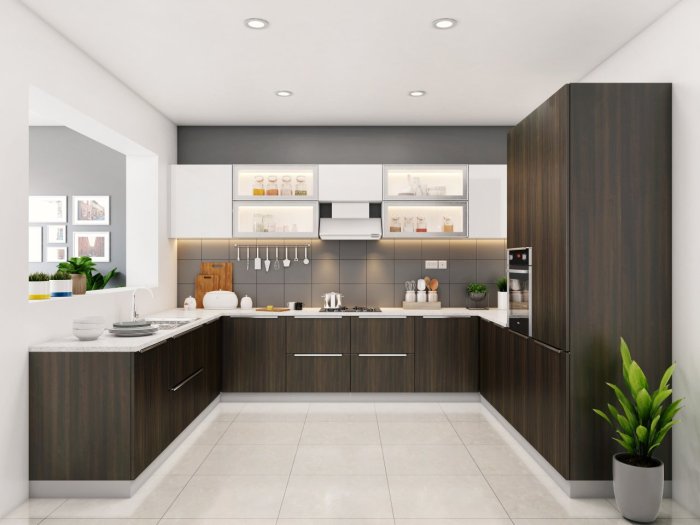
Modular kitchens offer a wide range of customization options to cater to individual preferences and functional requirements. These options include cabinet sizes, styles, finishes, and hardware, allowing homeowners to create a kitchen that is both aesthetically pleasing and practical.
One of the key advantages of modular kitchens is the ability to choose cabinet sizes that fit the available space perfectly. This eliminates the need for awkward gaps or overhangs, resulting in a clean and cohesive look. Additionally, modular kitchens come in various styles, from traditional to contemporary, allowing homeowners to match their kitchen’s design to their overall home decor.
Finishes
Modular kitchens offer a wide selection of finishes to complement any design scheme. From sleek high-gloss laminates to warm and inviting wood veneers, there is a finish to suit every taste. These finishes are not only aesthetically pleasing but also durable and easy to maintain, ensuring that the kitchen remains looking its best for years to come.
Hardware
Hardware plays a crucial role in the overall functionality and style of a modular kitchen. From handles and knobs to hinges and drawer slides, there is a wide range of options to choose from. These hardware components can be matched to the finish of the cabinets or used to create a contrasting accent, adding a personal touch to the kitchen.
Installation and Maintenance of Modular Kitchens
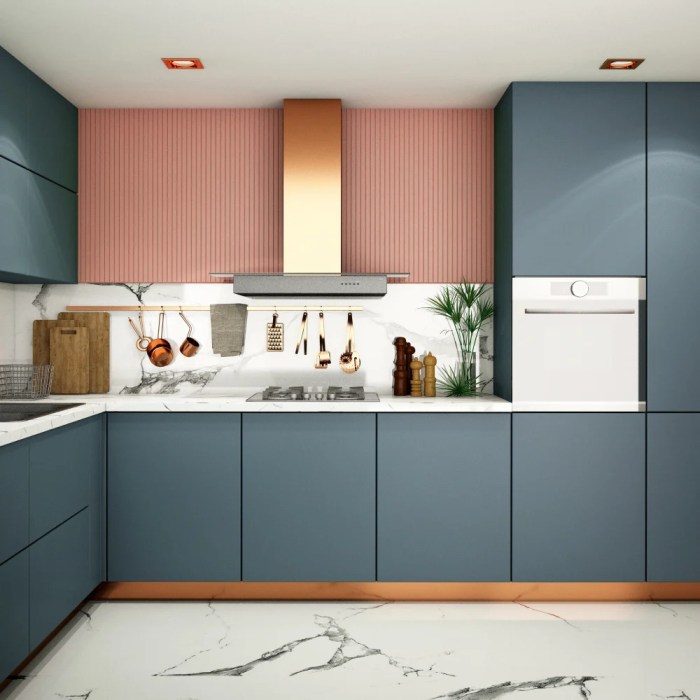
Installing and maintaining modular kitchens is essential to ensure their longevity and functionality.
Installation, Essential Elements of a Well-Designed Modular Kitchen
Installing modular kitchens involves several steps, including:
- Assembling cabinets and appliances.
- Installing countertops and backsplash.
- Connecting plumbing and electrical fixtures.
Proper installation requires precision and attention to detail. Hiring a professional installer is recommended to ensure the kitchen is installed correctly and safely.
Maintenance
Regular maintenance is crucial to keep modular kitchens in optimal condition. This includes:
- Cleaning surfaces with appropriate cleaning agents.
- Inspecting and tightening hardware regularly.
- Lubricating moving parts, such as hinges and drawer slides.
Proper maintenance extends the lifespan of the kitchen and prevents costly repairs in the future.
Wrap-Up: Essential Elements Of A Well-Designed Modular Kitchen

In conclusion, designing a well-designed modular kitchen requires careful planning, thoughtful material selection, and attention to detail. By following the guidelines Artikeld in this guide, you can create a functional, stylish, and durable kitchen that will enhance your cooking and dining experiences for years to come.
Clarifying Questions
What are the advantages of modular kitchens?
Modular kitchens offer numerous advantages, including flexibility in design, ease of installation, cost-effectiveness, and the ability to customize the kitchen to your specific needs and preferences.
What are the key components of a modular kitchen?
The key components of a modular kitchen include cabinets, drawers, countertops, appliances, backsplash, and lighting.
What factors should be considered when planning the layout of a modular kitchen?
When planning the layout of a modular kitchen, factors to consider include the kitchen triangle, storage needs, workflow, ergonomics, and accessibility.
What are the different materials used for modular kitchen cabinets?
Common materials used for modular kitchen cabinets include wood, laminate, PVC, metal, and glass.
